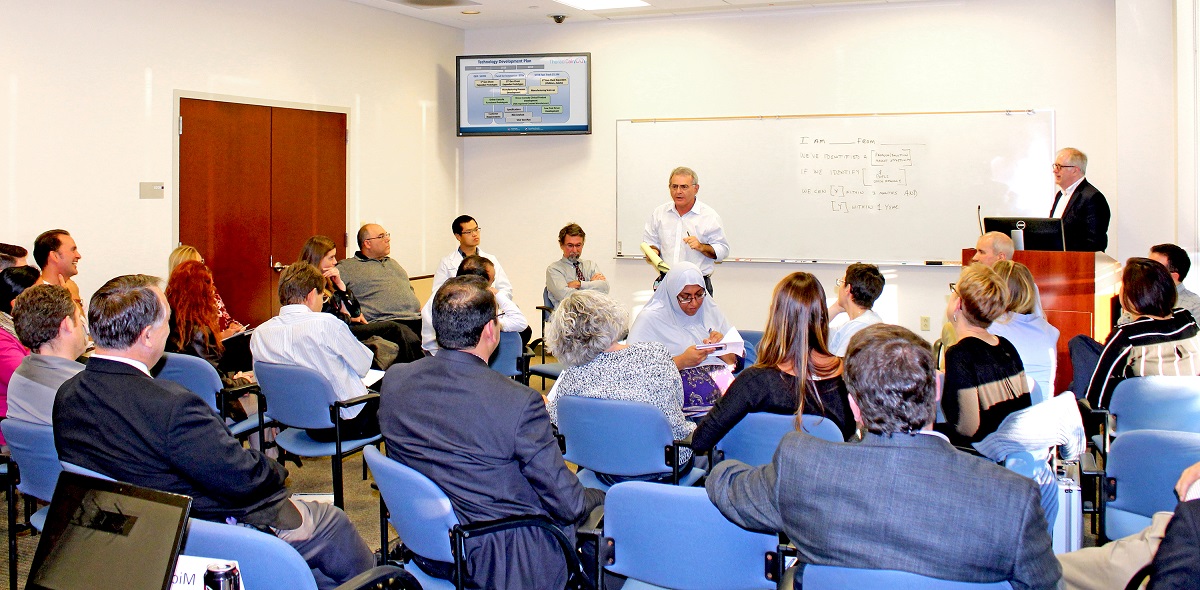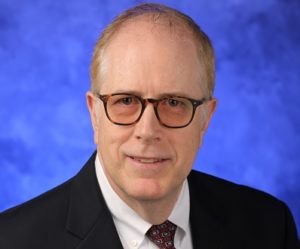Accelerating innovation: Course boosts biomedical ideas, College of Medicine’s mentor role

With an entrepreneurial spirit pushing him, Gregory Brown pondered an idea for helping Parkinson’s disease patients who are vulnerable to falls.
The MD/PhD medical scientist training program student at Penn State College of Medicine, who wants to connect engineering and science to help patients, theorized that he could come up with a device to assist people with the disease avoid falls. Then he participated in the I-Corps@National Center for Advancing Translational Sciences (NCATS) Innovation Training from the Center for Medical Innovation at Penn State College of Medicine and realized he had to find out what patients needed before he moved forward.
“The lesson learned was I need to identify the problems people have and build solutions around that,” he said.
He is now in the product development stage on a device that provides small amounts of electricity to the brain to help make physical therapy easier and more effective in these patients. Before I-Corps training he had not considered the importance of partnering his innovation with physical therapy.
Kevin Harter, associate dean of medical innovation and director of the Center for Medical Innovation, hears stories like Brown’s every time he leads an I-Corps training course.

Kevin Harter
“I see people rethink their entire thought process around an innovation once they are involved in the program,” he said. “The most exciting part for me is seeing participants make that change. A total rethinking happens frequently.”
The I-Corps@NCATS Regional Short Course training is a five-week course that combines entrepreneurial training, business model training and a customer discovery process. It is open to students and faculty.
The College of Medicine was notified in August that it is one of nine medical institutions included in a $3.1 million, three-year mentoring grant from NCATS at the National Institutes for Health.
College of Medicine staff are working as mentors with two universities, Case Western Reserve University and the University of Buffalo. The mission of the mentoring program is for the College of Medicine I-Corps leaders to teach other university professors how to conduct the course at their own universities.
The program’s overall goal is to improve the health of communities by speeding up the process of moving new discoveries from research labs into new treatments and cures for patients. This is done by helping academic researchers better understand the process for how to bring a new innovation to market and how to accelerate the process while reducing the risk that an innovation will fail.
Students, faculty and researchers have no shortage of great ideas, Harter said. But a lot of people don’t know how to move forward with those ideas. The outcome of being in the I-Corps program may be seeing a product move toward development, Harter said, or helping a team receive a critical grant.
Harter says his personal goal is to develop an innovative culture at the College of Medicine and see more basic research translate from the lab to clinical practice.
“It’s a gentle shift to see more of an impact from the research we are working on,” he said.
Eight teams completed the course this fall. Along with Brown’s Parkinson’s disease fall prevention device, other innovations included a heart circulatory device, a diagnostic tool to rapidly identify and treat epileptic seizures, a point-of-care diagnostic tool for animal medicine, an overactive bladder treatment device and a novel immunotherapy treatment.
Dr. Taraneh Soleymani, associate professor, Department of Medicine, and her husband, Dr. Sunil Daniel, both obesity medicine specialists, are passionate about delivering comprehensive obesity treatment. They joined the course as they work on their digital solution for personalized and evidence-based obesity treatment powered by artificial intelligence. Soleymani said her I-Corps@NCATS mentor guided them to better understand their customer segment and early adopters, a critical step in the entrepreneurial journey.
“The instructors had a way of challenging us, which is just what we needed,” said Soleymani.
As for Brown, he also benefited from the I-Corps idea of conducting several interviews to gather data. That helped guide his idea for product development and determine the key customer.
Harter said the program has not only has been rewarding for him but for the students as well.
“I really enjoy helping I-Corps students figure out where their innovations fit into the larger world,” said Harter, who was in the business world for 35 years before joining the College of Medicine in 2015.
If you're having trouble accessing this content, or would like it in another format, please email Penn State Health Marketing & Communications.
